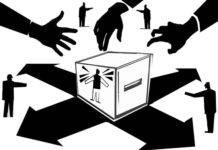It’s frustrating, shameful, they say

Civil society members find the apparent overenthusiastic role of foreign diplomats in Dhaka in finding a solution to the country’s ongoing political crisis ahead of the next general election as intervention in internal affairs and term it ‘unacceptable, frustrating, and shameful’.
“Such an intervention by some foreign diplomats in a democratic country like Bangladesh is embarrassing, frustrating and shameful for us,” Executive Director of Transparency International Bangladesh (TIB) Prof Iftekharuzzaman told UNB over phone.
He said he does not aware of such direct and indirect intervention in any other democratic country of the world. “Unfortunately, we (politicians) have created the scope for such an intervention or they (diplomats) have taken the advantage following confrontational politics.”
Secretary of Sushashoner Jonno Nagorik (Sujan) Dr Badiul Alam Majumder said, “We’ve given them (diplomats) a position of judges. We’re creating the scope for such intervention by complaining to them against each other. As friends, they can encourage us for solution but what they (diplomats) are doing is in no way acceptable.”
Responding to a question, he said during BNP’s tenure, Awami League leaders had knocked the doors of diplomats and now BNP leaders are doing the same. “We’ve to resolve our problems by ourselves. “
Prof Asif Nazrul of Dhaka University’s Law department in a conversation with UNB said, “It’s nothing new in Bangladesh. It doesn’t indicate anything new. We’ve been witnessing such intervention since the 90s.”
He said it indicates (our) bankruptcy, weaknesses in the country’s civil society and is the outcome of divisiveness. “If we remain divided as a nation, the dominance of foreign countries and diplomats will continue which is not good for us,” Prof Nazrul said.
Responding to a question, he said such foreign intervention in Bangladesh’s internal politics brought about a ‘solution’ in the past like 1/11 episode. “The same thing may happen in the future if we can’t resolve our problems by ourselves. But such a foreign solution isn’t good for us.”
TIB chief Prof Zaman also blamed the confrontational situation for such intervention, which does not fall within the diplomatic norms, and noted that it is essential for diplomats to stay clear of such activity, and politicians need to remain alert so that the diplomats cannot take any advantage. “It’s our failure. And in some cases they (diplomats) show over curiosity.”
He also said such intervention is not new in Bangladesh. “It has become a culture in this country. This should be stopped and it’s unnecessary. We think our politicians, the people of the country, media and civil society are enough to resolve our problems.”
The TIB chief expressed his frustration that there are some people who seek the diplomats’ support publicly. “This is not acceptable.”
Asked about the similar role of diplomats before the 1/11 episode, he said, “We don’t exactly know what had happened. But we understand that the culture of foreign intervention has expanded these days.”
Prof Zaman mentioned that countries like China and Japan had never talked about Bangladesh’s political issues so seriously. “This time China and Japan also joined the process (directly or indirectly).”
He, however, did note that the UN has a mandate to play a role in strengthening democratic process in nations through providing technical support and suggestions.
Asked whether the foreign diplomats can bring a neutral solution, he said, “It’s very difficult to determine objectivity as they’re making such interventions in a scattered way. If they come up with a united way as friends of Bangladesh and give suggestions that is a different thing.”
On Wednesday, Foreign Minister Dr Dipu Moni talked about the issue with the reporters after briefing diplomats on current political situation.
Responding to a question regarding a diplomat’s Dhaka-Delhi shuttling, Dipu Moni said if any diplomat has any concern about Bangladesh it must be shared with the authorities here (govt).
“I can comment if they speak on record. We hope the diplomats would express their concerns following the norms, which is expected,” she said, adding that the norm was to discuss any concern on Bangladesh with the authorities of Bangladesh, not outside.
“Talking about the issue outside (any foreign country) generally doesn’t fall within diplomatic norms. We hope they’ll abide by the diplomatic norms.”
Asked whether the diplomats were following the norms, she said, “I would say most of them are.”
Source: UNB Connect









